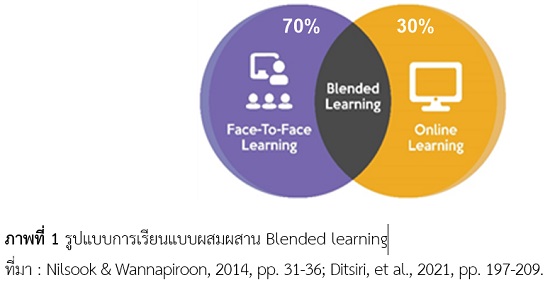DEVELOPING TECHNIQUES OF A BLENDED TEACHING MODEL BY MIAP METHOD (MOTIVATION, INFORMATION, APPLICATION, PROGRESS) FOR UNDERGRADUATE STUDENTS OF SMALL ENGINE AND MOTORCYCLE PRACTICE
DOI:
https://doi.org/10.14456/nrru-rdi.2022.29Keywords:
Small engine and motorcycle practice, Blended e-learning, MIAPAbstract
The four objectives of this research were to: 1) develop and find out the efficiency of the blended E-learning model; 2) compare learning outcome before and after learning by using the E-learning model; 3) study learner competency after using the E-learning model; and 4) assess the satisfaction of learners toward E-learning with the developed E-learning model. The sample consisted of 24 students in the Mechanical Technical Education program of Rajamangala University of Technology Isan Khon Kaen Campus, chosen by random sampling. The research instruments were a quality-based evaluation questionnaire for E-learning, with the quality of the content contained in the e-learning being at a very high level, the blended E-learning model competency plan on Practice on Vehicle Electrical and Electronics Systems course, the lesson plan of blended E-learning on competency base using MIAP method, a learning outcome test, an evaluation form of competency performance, and a learner satisfaction test. The data were analyzed with the statistics of mean, standard deviation and t-test. The four main results demonstrated that 1) the efficiency of the developed E-learning model satisfied the expectation criteria; 2) learning achievement of the mean post-test score was significantly higher than at the pre-test; 3) learners’ competency after using developed E-learning model was at the highest level; and 4) learners’ satisfaction towards the developed E-learning model was at the highest level, consistent with the hypothesis of the research.
References
Brahmawong, C. (2013). Developmental Testing of Media and Instructional Package. Silpakorn Education Research Journal, 5(1), 1-20. (In Thai)
Chaichuensaen, T., Sovajassatakul., T., & Ridhikerd, A. (2016). A development of blended learning with the integration of web-base instruction via cloud computing on bench work and the electronic circuits of undergraduate students. Journal of Industrial Education, 15(2), 26-32. (In Thai)
Chaiphia, E., Hongkong, S., & Siricharoenpanich, A. (2020). A study of learning achievement on web-based learning lesson of motorcycle practice for undergraduate students. Journal of Industrial Education, 19(2), 60-68. (In Thai)
Ditsiri, T., Rampai, N., & Siripipattanakul, S. (2021). Development of a Blended Learning Model BY Using an Active Learning Method to Enhance Pre-Service Teacher Education Student’ Information and Communication Technology (ICT) Competencies. NRRU Community Research Journal, 15(2), 197-209. (In Thai)
Fongjangwang S., & Kongmanus., K. (2017). The Development of Blended Instruction Model by Using Cooperative Learning in basic JavaScript Language Programming for Mathayom Suksa 3 Students. Journal of Communication Development Research (Humanities and Social Science) 10(4), 121-133. (In Thai)
Hongsa, S., Tungkunanan, P., & Kantathanawat, T. (2017). Development of STEM learning with web-base instruction on robot motion control for high school. Journal of Industrial Education, 16(2), 18-24. (In Thai)
Kladchuen R., & Sinthanakul., K. (2019). The Development of Blended Learning Model on Competency-Based Lesson Plan by Using MIAP Process for Data Communication and Network Course. Journal for Research and Innovation, 2(2), 117-127. (In Thai)
Leaudnakrob N., Sengsri S., & Pholjun., T. (2018). The Development of Blended Learning Model by Transformative Learning to Enhance Critical Thinking Ability of Nursing Students. Boromarajonani College of Nursing, Uttaradit Journal, 10(2), 209-211. (In Thai)
Nilsook, P., & Wannapiroon, P. (2014). Blended Management Learning : Blended Ratio. Journal of Technical Education Development, 25(85), 31-36. 23(1), 104-115. (In Thai)
Nuntasri, W., & Sinthanakul, K. (2019). The development of a blended e-learning model on competency-based using MIAP method in process for undergraduate students in computer education program. Journal of Industrial Education, 18(3), 25-32. (In Thai)
Phuangphae, P., Sirisamphan, O. (2015). The Development of an Instructional Model to enhance Social Studies learning activities design competency for pre-service teachers. Veridian E-Journal, Silpakorn University, 8(1), 430-447. (In Thai)
Samahito, C. (2021). Developing science and mathematics learning management competency of graduate students in early childhood education using phenomenon-base approach with e-learning media. Journal of Education Naresuan University, 23(1), 104-115. (In Thai)
Sopha, K., & Chantanarungpak, K. (2018). The Development of Blended Learning Model to Develop The Computer Graphics Skills Of Senior High School Students. Veridian E-Journal, Silpakorn University, 11(1), 87-102. (In Thai)
Srichailard P., Sinthanakul, K. (2017). The development of a blended e-learning programs and completency based plan for an internet administration and service course for computer education students. Journal of Industrial Education, 16(2), 18-24. (In Thai)
Thanachawengsakul, N., & Jeerungsuwan, N. (2018). Instructional model of MIAP on cloud computing technology of the undergraduate students in order to promote 21st century learning skill. Journal of Education Naresuan University, 20(4), 87-102. (In Thai)
Thongchuea, K., Sovajassatakul, T., & Pimdee, P. (2017). A development of blended learning via web-based instruction on process of condition and loop for grade 7 students. Journal of Industrial Education, 16(2), 25-32. (In Thai)

Downloads
Published
How to Cite
Issue
Section
License

This work is licensed under a Creative Commons Attribution-NonCommercial-NoDerivatives 4.0 International License.




